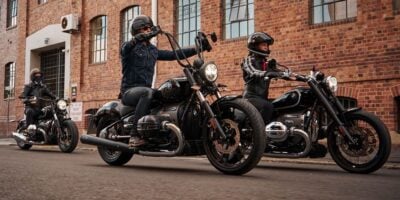Guitarist Dan Luscombe is sniffling down the line on a particularly frigid Melbourne morning (“It’s fucking horrible”). Up until earlier this year, Luscombe was the ‘new guy’ in The Drones, having joined Gaz Liddiard, Fiona Kitschin and Mike Noga back in 2007. Now the distinction goes to organist Steve Hesketh, who after making a few live appearances with the band over the years became a consolidated member with the release of I See Seaweed at the beginning of 2013.
“It took seven, nearly eight years,” Luscombe laughs over his belated induction. “I know how Ronnie Wood felt. He had to wait 30 or something years before that guy that nobody can remember joined the band to replace Bill Wyman. Stevie’s been a huge contributor musically and personality-wise to the band. He’s hilarious. We used to live together, Stevie and I, in our mid-20s. I remember he once gaffer taped a telephone to my head when I was talking to my mum. And I think he pulled my pants down. That’s the kind of guy Stevie is. It’s good to have him in the band, and I’m looking forward to getting my revenge now I’ve remembered it.”
After briefly emerging in 2011 from what could be classified a hiatus to celebrate the launch of DVD compilation A Thousand Mistakes, The Drones are back this year with a reinvigorated focus – having released a long-awaited new album, curated the return of ATP to Australia, toured fairly extensively and appeared at Splendour In The Grass. However, the pace of their return is far more measured than previous touring cycles. “It feels more relaxed than it’s ever felt for us. It feels like we’ve got through a very difficult adolescence or something, now we can relax and be adults. When I joined the band it was pretty much immediately on the road for four or five years, and we didn’t really stop a lot during that time. The fact that we didn’t literally murder each other is kind of a miracle.”
“With that behind us, knowing we can come through something like that, it just solidified our relationship as people. It also made us very instinctive live players. We would be doing over 100 shows a year … [to] play that amount of shows in Australia isn’t easy, unless you want to disappear into regional touring for the rest of your life, or head overseas and keep busy over there.”
“It was a very itinerate life for a few years,” Luscombe continues. “The benefits of [heavy touring] mean you should become a good band, but the downside is that you don’t have much of a life for a while. That’s why we took a really long break between this album and the last. It became obvious to everyone in the band that we needed to step away for a while and get some semblance of a normal life – to put your name on a bond for a change. With all that behind us, then having a good time making this record, it was nice knowing the break served us well. It was also nice knowing that the worst of our behaviour was behind us. We’re not as volatile characters as we used to be, we don’t snap or argue with each other anymore. Just a bit more chilled out.”
With that renewed focus, Luscombe can’t envision a need for The Drones to take another elongated break anytime soon. “The thing that’s going to stop us these days is people losing interest, because we’re not going to lose interest anytime soon. We’re really enjoying the music that we’re making now.”
BY LACHLAN KANONIUK
The Drones play Metro Theatre on Saturday September 28 with Harmony.I See Seaweedout now independently through MGM.

































